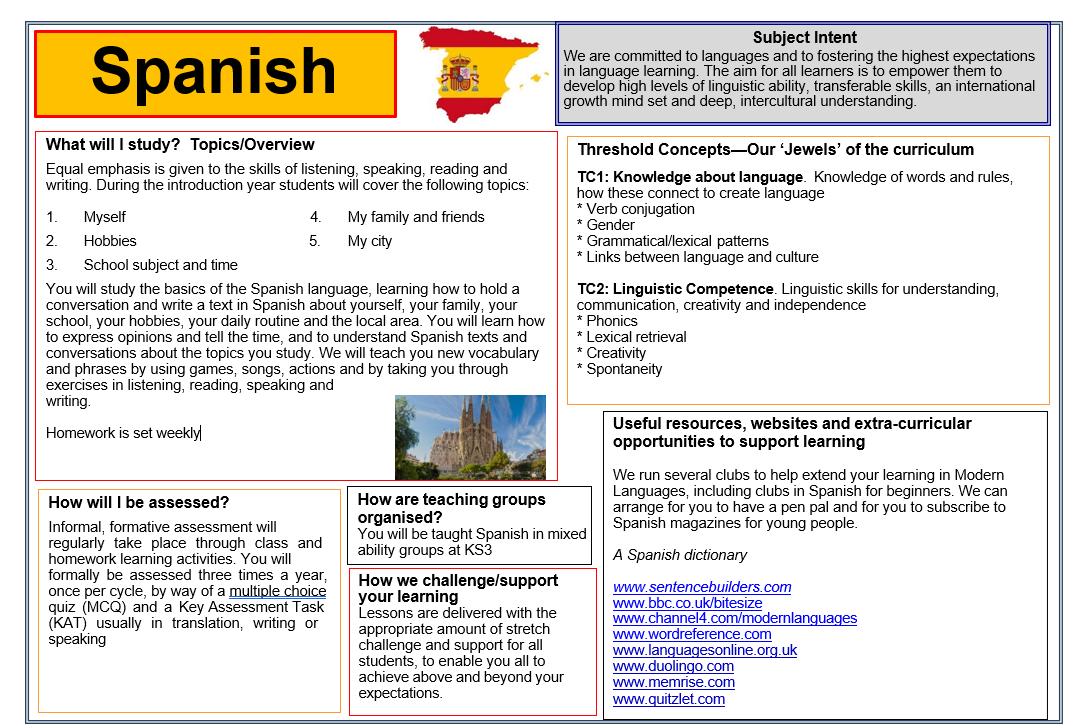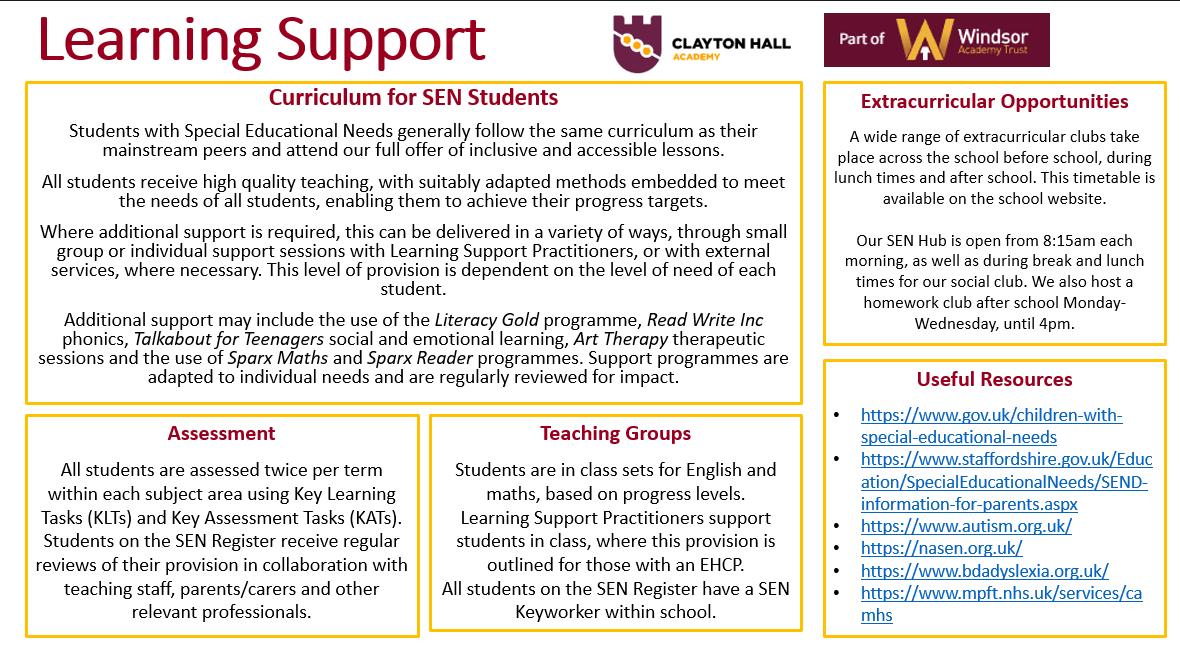
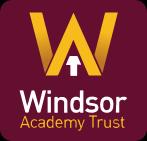



Year 7 2025-2026

• Curriculum Guide – Deputy Headteacher
• Threshold Curriculum Framework
• How you can help as a parent
• English
• Maths
• Science
• Art and Design
• Computing and IT
• Design and Technology
• Drama
• French
• Geography
• History
• Music
• PE
• Religious Education
• Spanish
• Learning Support Note


Dear Parent/Carer

At Clayton Hall Academy, we are proud of the support and guidance we offer our students and their parents. We place great importance on our home school links and consider it very important for students to know that home and school are working together in their interests.
Our Curriculum Guide for year 7 shows you what your child is learning and the key skills they are developing within each subject and across the curriculum.
Our curriculum intent is to ensure all students, regardless of background and ability, have the opportunity to “unlock their academic and personal potential”
We are committed to students being challenged from their previous key stage learning experiences, and providing them with the foundation for academic success in examinations
Miss R Jones
Deputy Headteacher for Teaching, Learning and Curriculum
Builds on KS2 Primary curriculum. The year 7—9 curriculum provides the foundations for academic success in examinations. The curriculum framework consists of the following;
Threshold Concepts Threshold concepts define potentially powerful transformative points in the student’s learning experience. They are the ‘jewels in the curriculum’ because they identify key areas that need mastery. Until students ‘get them’, they can struggle to understand a subject.
Mastery / Deep Learning
The route to deep learning and the development of expertise and mastery is to do fewer things in greater depth. Threshold Concepts are mastered through repeated sequencing that allows the student to apply Threshold Concepts into different contexts.
Long term Memory
• sequencing
• story telling
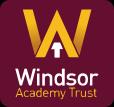
The provision of difficult work that causes students to think deeply and engage in healthy struggle—a high challenge, low risk culture is created.
Long term memory is the foundation for incorporating and making sense of new knowledge. Material sits in the long term memory when it has been ‘chunked’ into meaningful schemata, stories or concepts. Sequencing Threshold Concepts over the journey of the curriculum helps students to make progress and allows them to apply the Threshold Concepts into different contexts within and across subjects.
Tier 2 and Tier 3 vocabulary
To have access to and master deep subject knowledge, students need to be exposed to the cultural capital of language. Tier 2 are general academic words which occur across different subjects and are essential for reading comprehension. Tier 3 are subject specific words. The richness of vocabulary allows students to enter the academic discipline and address social Mobility.
The Windsor Academy Trust ASPIRE character framework identifies fourteen character virtues that are explicitly taught through the curriculum, virtues such as teamwork and resilience.


At Clayton, we want your child to succeed. You can help us to help your child to settle in to year 7 in the following ways: Please work with us to make sure that your child:
• Has a suitable bag for books and equipment (check their bag with them the night before to make sure they have what they need)
• Always brings the correct equipment to school, including their charged iPad
• Does remote learning (homework) regularly
• Reads regularly (encourage them to use Sparks and the school library)
• Talks to you about progress in school and targets set
• Attends regularly and is always punctual
• Participates in out of hours learning opportunities and House activities
Miss B Higginson- Head of Year 7 BHigginson@claytonhall.windsoracademytrust.org.uk
Miss L Dixon- Senco LDixon@claytonhall.windsoracademytrust.org.uk
Yr7 Formtutors: Staff List | Clayton Hall Academy
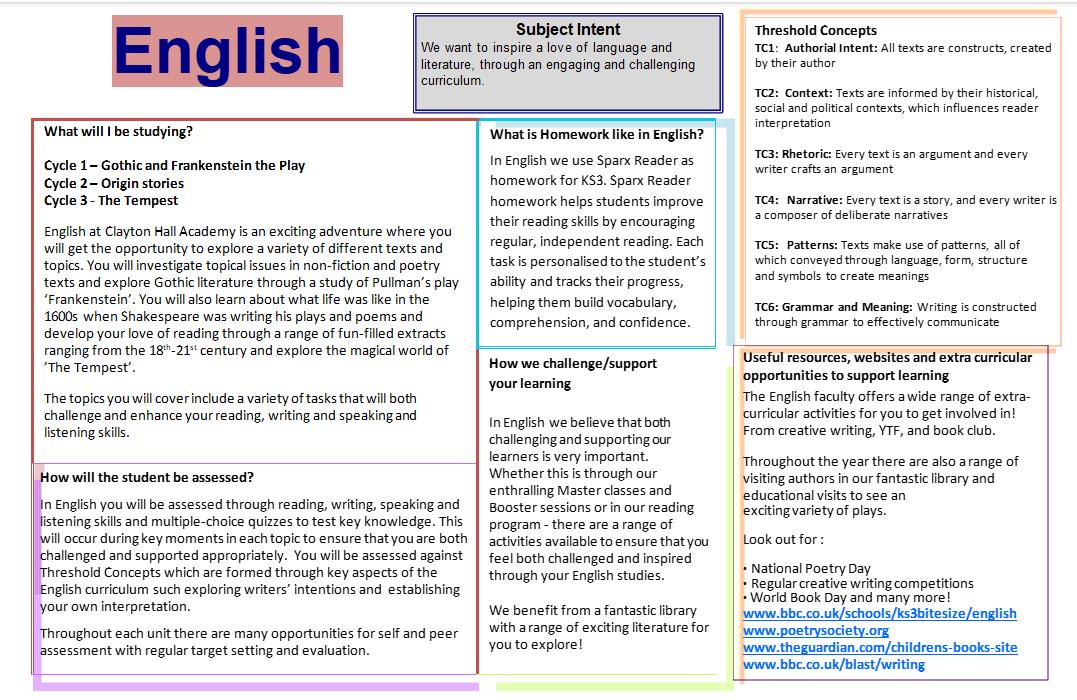

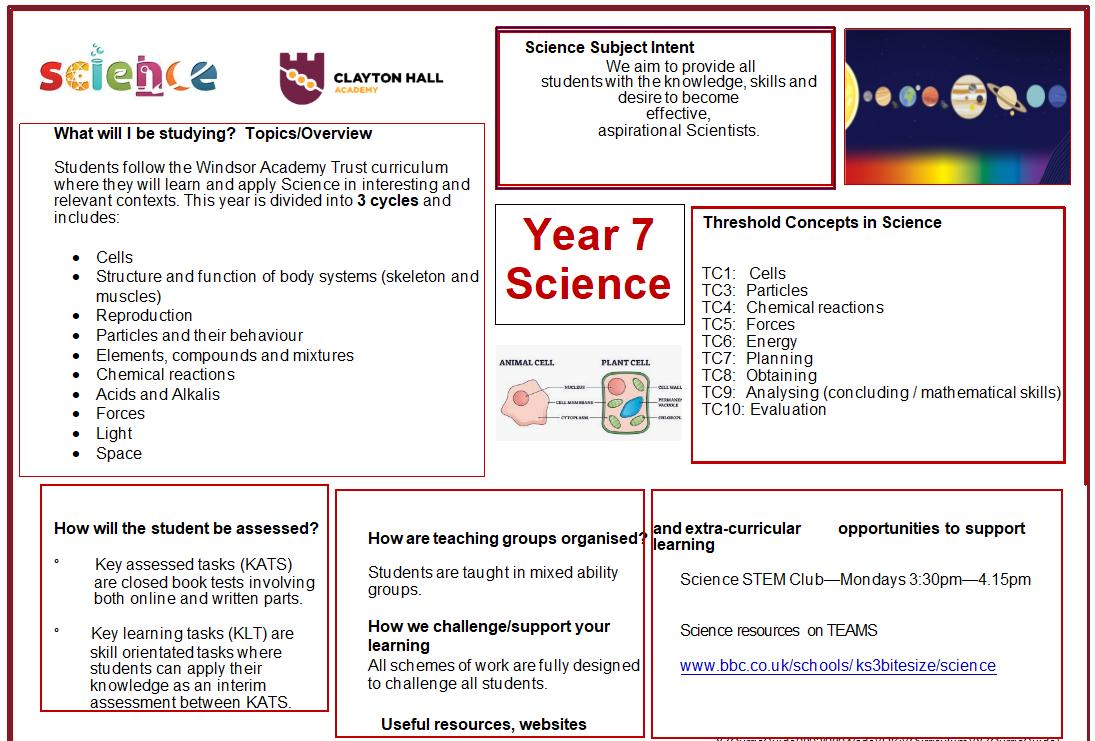
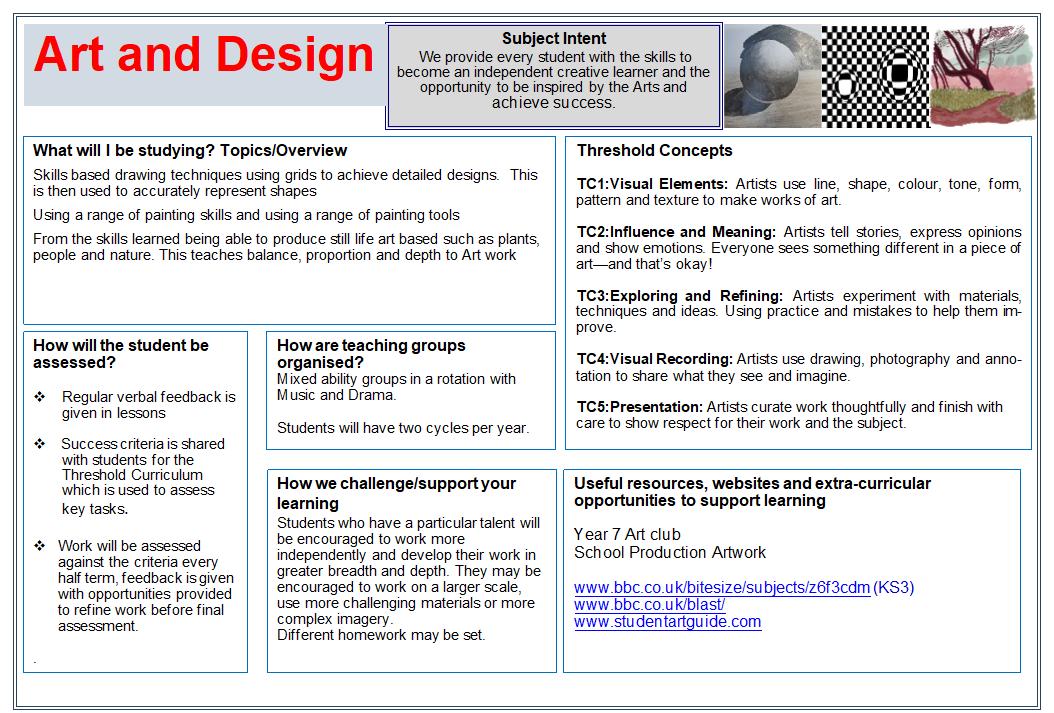
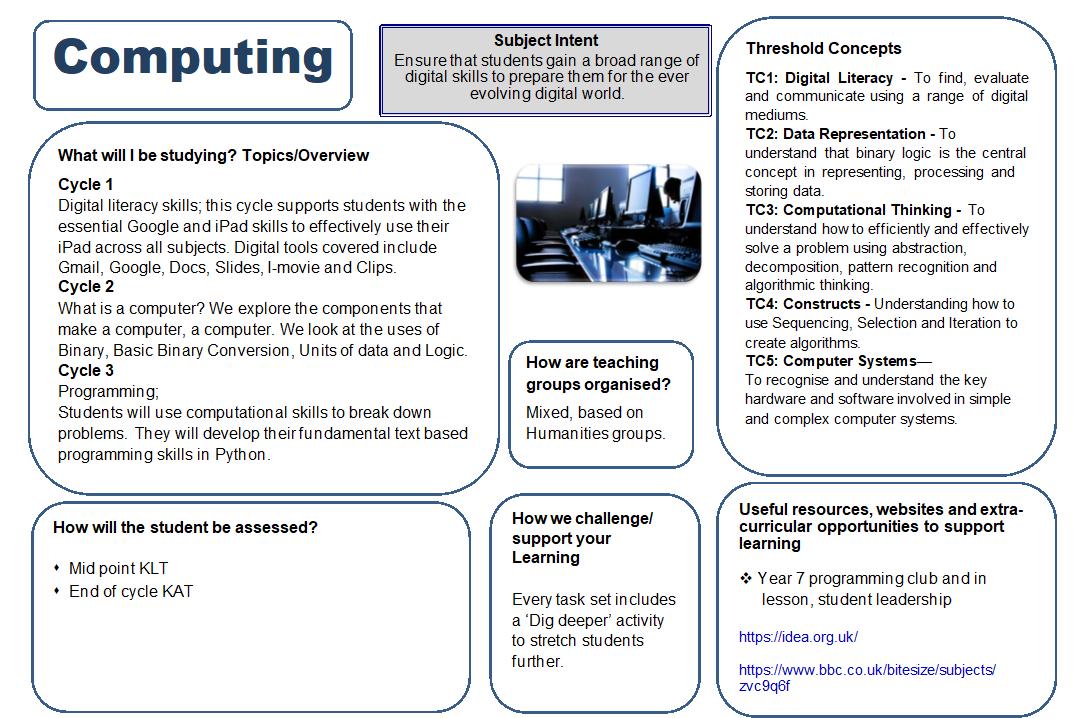
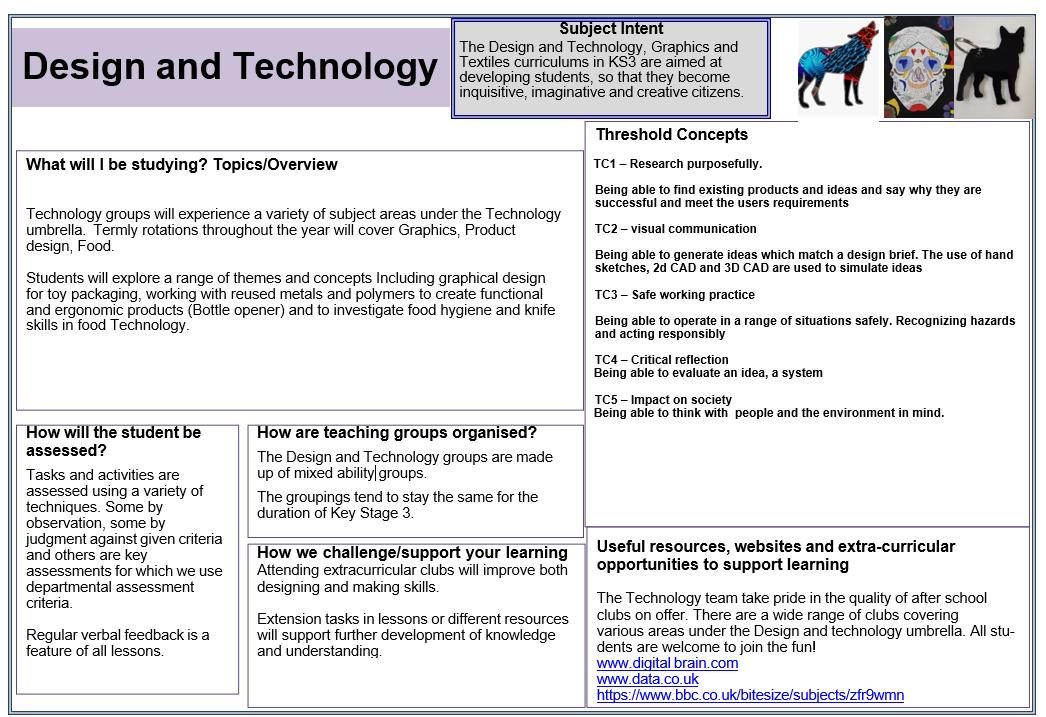

We are committed to languages and to fostering the highest expectations in language learning. The aim for all learners is to empower them to develop high levels of linguistic ability, transferable skills, an international growth mind set and deep, intercultural understanding.
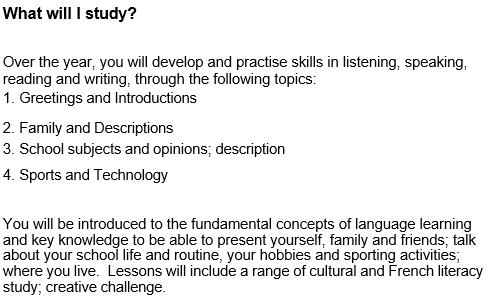
Informal, formative assessment will regularly take place through class and homework activities . You will formally be assessed 3 times per year, once per cycle by Multiple Choice questions and KATs including translation, writing or speaking.
You will be taught French in mixed ability groups throughout KS3.
Lessons are delivered with an appropriate amount of stretch, challenge and support. We use choral strategies to encourage oracy as well as 1:1 speaking activities.

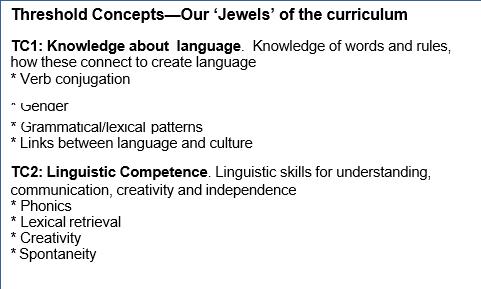
Useful Resources, websites and extra curricular opportunities to support learning: Clubs, enrichment and language activities are organised throughout the year.
www.languagesonline.org.uk www.livinglibrary.co.uk/s_browse.asp www.linguascope.com www.languagesonline.org www.duolingo.com www.wordreference.com www.sentencebuilders.com
We aim to provide all students the knowledge and skills to become effective Geographers and citizens in the 21st century.
TC1: To look at what makes places unique and different, but also how places share similarities.
What will the student be studying? Topics/Overview
This topic focuses on a case study of China whilst including Key ge- ographical skills such as Map skills, Human and Physical Geogra- phy, development and a comparison with other countries across the world.
This topic includes study of coasts in the UK, along with geology and the process that shape our landscape.
This topic includes study of how places are changing over time due to weather events,the weather hazards, where they occur and sustainable manage- ment strategies to reduce the risks that they pose.
How will the students be assessed?
Each unit of work has assessment opportunities and three KATs (Key Assessment Tasks) will be completed during the year.
You will be assessed using the threshold frameworks for geography that are specific to each study programme.

How are teaching groups organised?
Students are taught in mixed ability classes.
How we challenge/support your learning
Independent project work is available to challenge more able students. The Threshold has been designed to enable increased depth and challenge for students.
TC2: To understand natural and human patterns found on Earth and to understand that these are not random.
TC3: Geographers understand processes are key to explaining what the earth is like and why it is changing.
TC4: To understand that there are interactions between different components and concepts. This reinforces the idea that places are not separate but are interdependent with each other.
TC5: To understand a range of perspectives/ stakeholder views that exist on an issue to be able to find the most appropriate solution.
TC6: To recognise and understand that sustainability (social, economic and environmental) is now a key strategy in a range of areas of Geography.
Useful resources, websites and extra-curricular opportunities to support learning: www.googlemaps.com
Google Maps http://www.bbc.co.uk/schools/websites/11_16/ https://s-cool.co.uk/gcse/geography
In Cycle 1, students journey back to prehistory through the fascinating story of Cheddar Man, learning how to investigate the past using real historical evidence. They then explore how the Norman Conquest helped shape England and begin comparing powerful medieval rulers from around the world.
In Cycle 2, students continue their exploration of medieval monarchs before diving into the dramatic events of the Black Death uncovering its causes, devastating impact, and the powerful story of the Peasants’ Revolt led by Wat Tyler. They also challenge common misconceptions by learning about the lives of Black Tudors, discovering the fascinating stories of individuals who lived in Tudor England long before the transatlantic slave trade.
In Cycle 3, students investigate the causes, key events, and lasting impact of the English Civil War, discovering how it transformed the monarchy and government in England. They then shift focus to West Africa, exploring the rich culture, traditions, and beliefs of the Akan people in modern-day Ghana before examining how European involvement led to the transatlantic slave trade.
Our mission is to create historians who have an enquiring mind, read critically, are able to appreciate how history in constructed and see history as an unfolding story which involves us all.
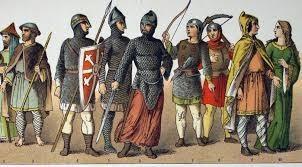
TC1– Interpretation - Understanding that history is subjective
TC2- Source analysis
TC3- Cause and consequence -Understand that history is interconnected
TC4- Chronology - to understand the order in which things happen
TC5- Appreciate the significance of a person or event
TC6- Understand factors that lead to change and continuity
TC7- Similarity and difference - understand how far lives of people in one area or historical period are the same as in another
How will the student be assessed?
You will be assessed in two ways, through Key Assessment Tasks and continual teacher assessment based on classwork.
Students are taught in mixed ability classes for history.
• Targeted questioning to ensure high challenge for all
• Stretch and challenge
• Differentiated work
• Collaborative work
Useful resources, websites and extra-curricular opportunities to support learning

All KS3 classes have a History Google Classroom, which are updated with key resources (knowledgeorganisers, website links) by their class teacher.
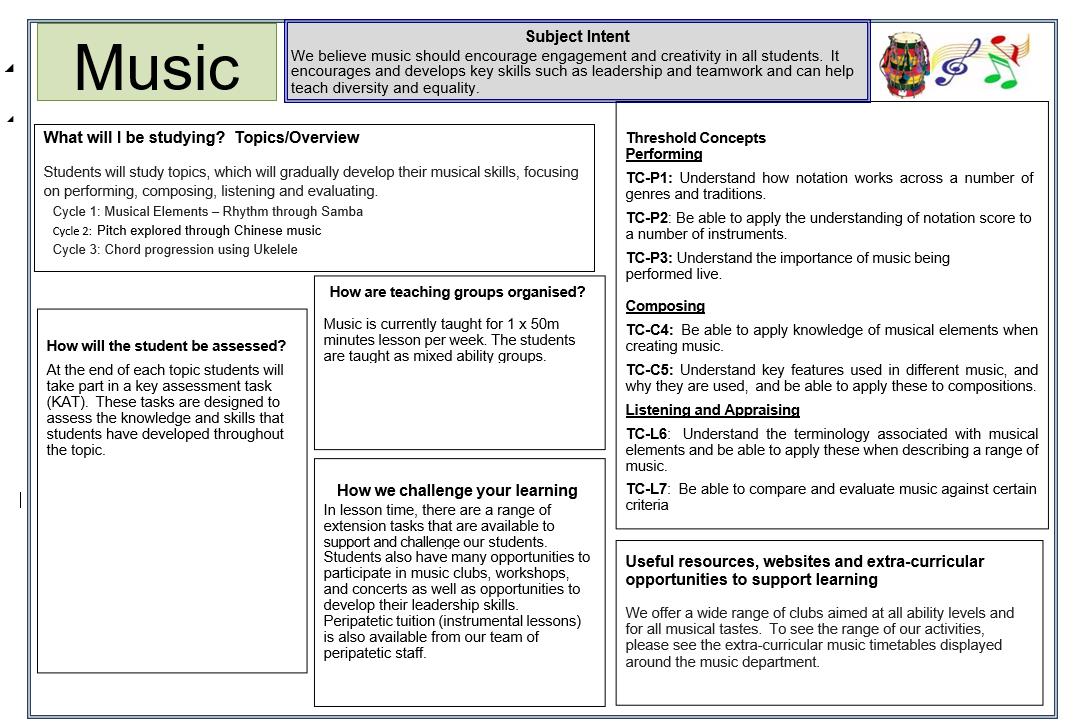

Curriculum Intent : Creating excellent philosophers and respectful religiously literate citizens of the future.
In Cycle 1, students explore some of life’s biggest questions like “Who is God?” and “Does God exist?” while learning how to think critically and respectfully about different beliefs. They explore how religions understand the nature of God, including the 99 names of Allah in Islam, and some of the religious ‘rules’ such as the 5 Ks in Sikhism, the 10 commandments. They also reflect on how faith can shape a person’s identity and values and have the opportunity to reflect on their own beliefs.
In Cycle 2, students explore how and why people worship across different religions, building their understanding of key practices and sacred spaces. They learn about Christian traditions like the Lord’s Prayer and Holy Communion, and compare worship in a mosque, church, and synagogue. Celebrations such as Christmas and Id Ul-Fitr help students reflect on the meaning and importance of religious festivals.
In Cycle 3, students explore the idea of miracles—both in the life of Jesus and in the modern world—and consider how religious experiences shape belief. They tackle big questions about science, faith, and the existence of evil, examining concepts like the design argument, the origin of sin, and whether evil is a test. Through these discussions, students develop their critical thinking and reflect on how different worldviews make sense of life’s challenges.
How will the student be assessed?
Students will be formally assessed at the end of each unit.
The assessments are of a formal written nature, reflecting on both A01 (learning about religion) and A02 skills (learning from religion).
Reflecting on our Cloud 9 journey in Religious Education—where we Get, Apply it, Refine it and Show it; after these assessments students will spend time reflecting on theirprogress to identify how they can advance further.
Students are taught in mixed ability groups.
Students study Religious Education once a week during a 50 minute lesson when studying Religious Education in KS3.
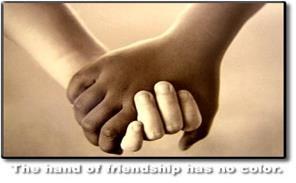
•To understand that religious beliefs are interpreted differently, even with in the same religion or denomination.
•To understand that religious practices have varying levels of adoption.
•To understand that misconceptions exist surrounding religious beliefs and practices that need addressing.
•To understand that religious values can be accepted and adopted by non-religious believers.
•To understand the varying impact of modern, often secular based, challenges to religious beliefs.
•To understand the influence key beliefs, teachings and practices have on religious believers, and at times non-religious believers, today (individuals, society and community).
•To understand the variety of sources of authority within religion and the different approaches to them.
•To understand the symbolisms found within religion.
Every single student will be challenged to make progress within Religious Education. Every single lesson is planned to provide high challenge for all students, to support all students to make excellent progress. Additionally, reflecting on our Cloud 9 journey in Religious Education, students will be frequently challenged to reflect on their work to improve their skillset.
Useful resources, websites and extra-curricular opportunities to support Learning Websites
BBC Bitesize KS3 Religious Studies RE Online RE Quest
All KS3 classes have a Religious Education Google Classroom, which are updated with resources by theirclass teacher. Books
Please visit the school library to see our extensive range of KS3 Religious Education books.
